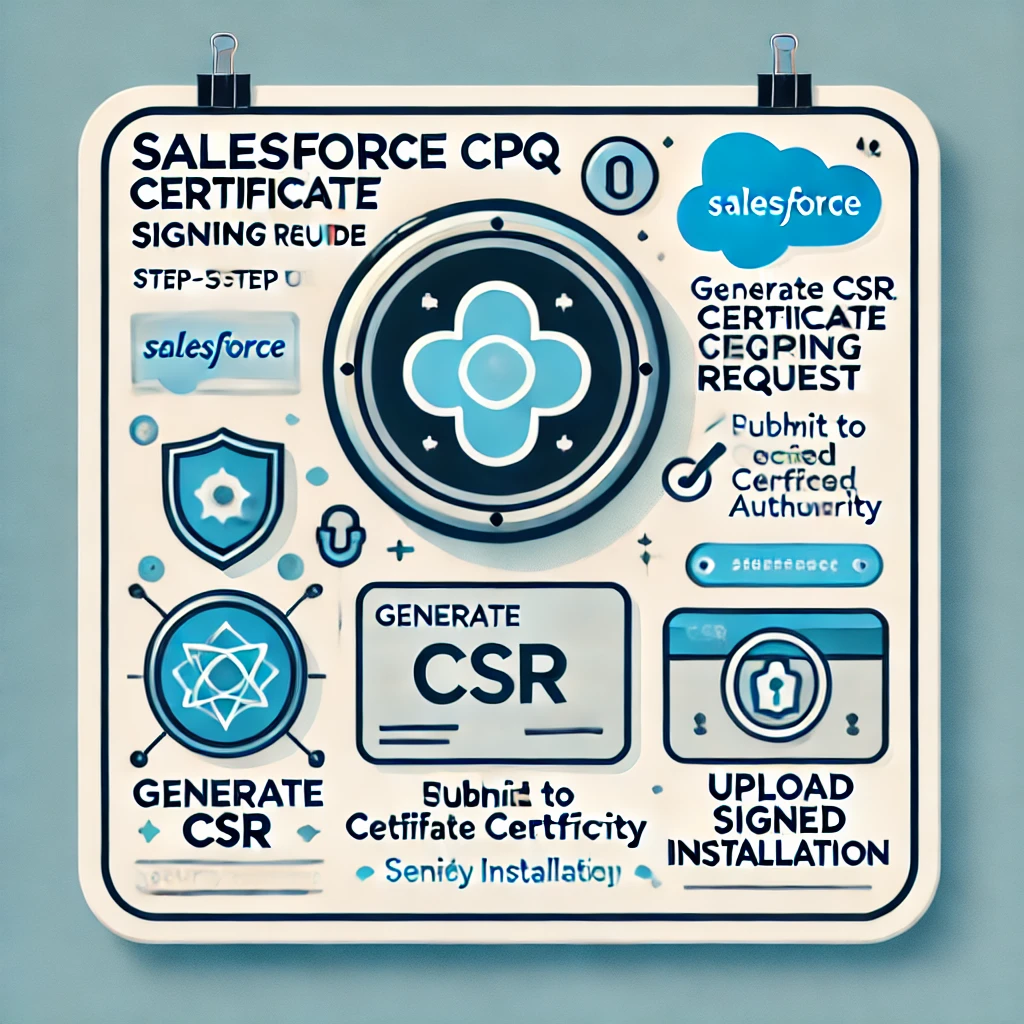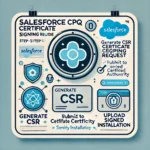Salesforce CPQ:
Salesforce CPQ (Configure, Price, Quote) is a powerful tool that enables sales teams to generate quotes efficiently and accurately. As part of setting up Salesforce CPQ, you may need to configure secure certificates for your environment, which involves creating a Certificate Signing Request (CSR). This guide will walk you through the process step by step to ensure a smooth and secure setup.
What is a Certificate Signing Request (CSR)?
A Certificate Signing Request (CSR) is a block of encoded text generated on your server that contains information about your organization. It is submitted to a Certificate Authority (CA) to request a digital certificate, which ensures that your Salesforce CPQ environment can securely communicate with other systems.
Key information included in a CSR:
- Organization Name
- Common Name (Domain Name)
- Location (City, State, Country)
- Public Key
Once the CSR is created, it is sent to a trusted Certificate Authority to obtain the digital certificate.
Why You Need a CSR in Salesforce CPQ
Salesforce CPQ often integrates with other systems, and secure data transmission is crucial for ensuring that sensitive information, such as pricing or customer data, remains protected. A digital certificate ensures that the communication between Salesforce CPQ and external systems is encrypted and secure, preventing unauthorized access.
Step-by-Step Guide to Generate a CSR for Salesforce CPQ
Step 1: Access Salesforce Setup
- Navigate to Setup in your Salesforce environment.
- In the Quick Find box, search for Certificate and Key Management.
- Click on Certificate and Key Management to enter the relevant settings.
Step 2: Create a New Certificate
- Click Create Self-Signed Certificate if you don’t already have a certificate.
- Fill in the necessary details, including Label and Unique Name. For Domain, enter the fully qualified domain name (FQDN) of your Salesforce environment.
Step 3: Export the CSR
- Once your self-signed certificate is created, click on the certificate name to view details.
- Click the Download Certificate Signing Request (CSR) button. The CSR file will be saved to your computer.
Step 4: Submit CSR to a Certificate Authority (CA)
- Choose a trusted CA, such as VeriSign, DigiCert, or GlobalSign.
- Submit the CSR file to your chosen CA following their submission process.
- The CA will validate the information in the CSR and issue a digital certificate.
Step 5: Upload the Signed Certificate
- Once the CA provides the signed certificate, return to Certificate and Key Management in Salesforce.
- Click on Import from Keystore and upload the signed certificate.
- Ensure that the certificate is associated with the appropriate domain and service.
Step 6: Verify the Certificate Installation
- After the certificate is uploaded, Salesforce CPQ will use it for secure communication.
- Test your Salesforce CPQ integration to ensure secure, encrypted data transmission is functioning correctly.
Best Practices for Managing Your Salesforce CPQ Certificates
- Regularly Update Certificates: Certificates have an expiration date. Set reminders to renew and update certificates before they expire to avoid any disruption in secure communication.
- Choose a Trusted CA: Always select a reputable Certificate Authority to ensure the security and integrity of your digital certificate. Avoid using self-signed certificates in production environments as they may not be trusted by other systems.
- Monitor Expiry Dates: Use Salesforce’s Certificate and Key Management dashboard to monitor the status of your certificates and renew them before expiration.
- Use Strong Encryption: Ensure that your CSR is configured to use strong encryption (e.g., 2048-bit key length) to enhance security. This prevents attackers from easily breaking the encryption and accessing sensitive data.
How to Integrate Salesforce with Top Ecommerce Platforms
How Einstein Data Detect Transforms Data Protection
Salesforce Data Cloud Ingestion: Features, Benefits, and Best Practices
Why the Salesforce Schwag Tracker is Essential for Merchandise Management
Top 8 Shield Encryption Salesforce limitations
Common Issues and How to Resolve Them
- Expired Certificate: If your certificate expires, Salesforce CPQ integrations may fail. Always ensure certificates are renewed before expiration by monitoring their validity in the Certificate and Key Management section.Solution: Renew the certificate before it expires by generating a new CSR and following the same steps as outlined above.
- Mismatch in Common Name (Domain): The Common Name (CN) in the certificate must match the domain name of your Salesforce environment. A mismatch can cause the certificate to be invalid.Solution: Double-check that the correct domain name is entered when generating the CSR. If you change your domain, generate a new CSR and request a new certificate.
- Certificate Authority (CA) Rejection: In some cases, the CA might reject your CSR due to incorrect or incomplete information.Solution: Review your CSR details and ensure all fields are accurately filled out, including organization name, location, and common name (domain).
Conclusion
Generating a Certificate Signing Request (CSR) for Salesforce CPQ is a critical step in securing your integration and ensuring the safe transmission of sensitive data. Following this step-by-step guide, you can easily create and manage your certificates, ensuring your Salesforce CPQ environment remains secure and compliant with industry standards.
By adhering to best practices and regularly monitoring your certificates, you will safeguard your organization’s data and ensure smooth and secure operations across integrated systems.
FAQs
Q1: What happens if my Salesforce CPQ certificate expires?
If your certificate expires, secure communications between Salesforce CPQ and other systems will fail, potentially causing data transfer interruptions. Always monitor expiration dates and renew certificates in advance.
Q2: Can I use a self-signed certificate for Salesforce CPQ?
While self-signed certificates are acceptable for testing environments, they are not recommended for production environments as they are not trusted by external systems. Use certificates from trusted CAs for production environments.
Q3: How do I know if my Salesforce CPQ integration is secure?
Once the certificate is uploaded and configured, test the integration to ensure secure data transmission. You can use browser tools or network analyzers to verify that data is encrypted during transmission.
Q4: How often should I renew my Salesforce CPQ certificate?
Most certificates expire after one or two years. Set up a reminder to renew your certificate well before it expires to avoid any service interruptions.
Q5: Can I reuse the same CSR for multiple certificates?
No, each CSR is unique and should only be used once. Generate a new CSR each time you need to request a new certificate.



